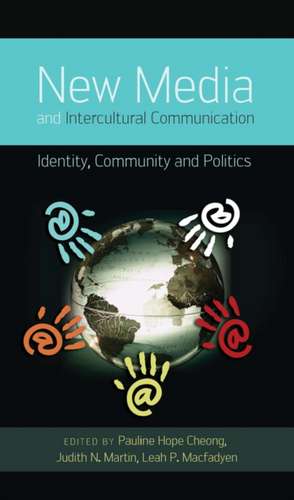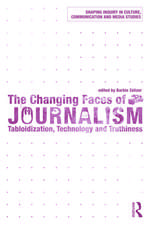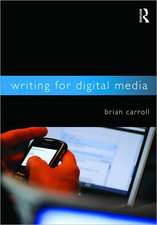New Media and Intercultural Communication: Critical Intercultural Communication Studies, cartea 13
Editat de Pauline Hope Cheong, Judith N. Martin, Leah P. Macfadyenen Limba Engleză Hardback – 22 apr 2012
| Toate formatele și edițiile | Preț | Express |
|---|---|---|
| Paperback (1) | 381.71 lei 43-57 zile | |
| Peter Lang Gmbh, Internationaler Verlag Der W – 27 mar 2012 | 381.71 lei 43-57 zile | |
| Hardback (1) | 1018.29 lei 43-57 zile | |
| Peter Lang Gmbh, Internationaler Verlag Der W – 22 apr 2012 | 1018.29 lei 43-57 zile |
Din seria Critical Intercultural Communication Studies
-
 Preț: 371.10 lei
Preț: 371.10 lei -
 Preț: 500.39 lei
Preț: 500.39 lei - 8%
 Preț: 527.42 lei
Preț: 527.42 lei - 8%
 Preț: 494.08 lei
Preț: 494.08 lei -
 Preț: 328.18 lei
Preț: 328.18 lei -
 Preț: 331.66 lei
Preț: 331.66 lei -
 Preț: 334.34 lei
Preț: 334.34 lei -
 Preț: 318.57 lei
Preț: 318.57 lei - 8%
 Preț: 520.70 lei
Preț: 520.70 lei -
 Preț: 365.55 lei
Preț: 365.55 lei - 23%
 Preț: 507.37 lei
Preț: 507.37 lei -
 Preț: 395.40 lei
Preț: 395.40 lei - 23%
 Preț: 639.26 lei
Preț: 639.26 lei - 27%
 Preț: 673.00 lei
Preț: 673.00 lei - 9%
 Preț: 780.13 lei
Preț: 780.13 lei - 23%
 Preț: 635.44 lei
Preț: 635.44 lei - 23%
 Preț: 641.35 lei
Preț: 641.35 lei -
 Preț: 328.37 lei
Preț: 328.37 lei -
 Preț: 153.89 lei
Preț: 153.89 lei - 7%
 Preț: 183.87 lei
Preț: 183.87 lei - 8%
 Preț: 181.60 lei
Preț: 181.60 lei
Preț: 1018.29 lei
Preț vechi: 1394.91 lei
-27% Nou
194.84€ • 203.98$ • 161.22£
Carte tipărită la comandă
Livrare economică 07-21 aprilie
Specificații
ISBN-10: 1433113651
Pagini: 337
Ilustrații: illustrations
Dimensiuni: 233 x 158 x 25 mm
Greutate: 0.65 kg
Ediția:2 Rev ed.
Editura: Peter Lang Gmbh, Internationaler Verlag Der W
Seria Critical Intercultural Communication Studies
Notă biografică
Pauline Hope Cheong (PhD, University of Southern California) is Associate Professor at the Hugh Downs School of Human Communication, Arizona State University. Her multidisciplinary research focuses on the socio-cultural implications of communication technologies. She has published widely in flagship journals including New Media and Society, Journal of Computer Mediated Communication, Information, Communication and Society, The Information Society, Journal of Communication and Journal of International and Intercultural Communication. Judith N. Martin (PhD, Pennsylvania State University) is Professor of Intercultural Communication in the Hugh Downs School of Human Communication at Arizona State University. She has published numerous research articles in Communication journals as well as other disciplinary journals and has co-authored three textbooks in intercultural communication with Thomas K. Nakayama: Intercultural Communication in Contexts, Experiencing Intercultural Communication, and Readings in Intercultural Communication. Leah P. Macfadyen (PhD, The University of British Columbia) is a researcher and instructor in the Faculty of Arts at The University of British Columbia in Vancouver, Canada. Most recently, her writing on aspects of culture, identity and online education have appeared in edited collections such as Digital Differences: Perspectives on Online Education (2010) and Learning Cultures in Online Education(2010).








